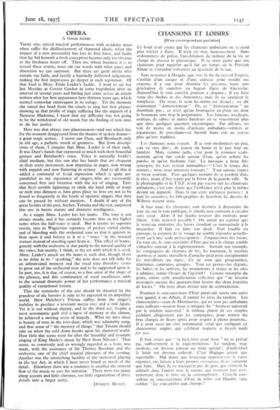OPERA
A Great Isolde
THOSE who attend musical performances with assiduity must often suffer the disillusionment of shattered ideals, when the
impact of a new personality has lost its first force, and faults that lay hid beneath a fresh conception become only too obvious as the freshness wears off. Then we, whose business it is to record these events, must eat our words with what grace and discretion we can summon. But there are great artists who sustain our faith, and justify a hurriedly delivered judgement, making the first impression go deeper at each repetition. Of that kind is Mine. Frida Leider's Isolde. I went to see her last Monday at Covent Garden in some trepidation after an interval of several years and having just come across an article written after her first appearance here thirteen years ago, which seemed somewhat extravagant in its eulogy. Yet the moment she raised her head from the couch to sing her first phrase, showing us that profile of tragic suffering like the anguish of a Siennese Madonna, I knew that my difficulty was not going to be the withdrawal of old words but the finding of new ones to do her justice.
Here was that always rare phenomenon—and one which has for the moment disappeared from the theatre of spoken drama—
a great tragic actress. I never saw Duse, and Bernhardt only in old age, a pathetic wreck of greatness. But from descrip- tions of them, I imagine that Mme. Leider is of their rank.
It was Duse's hands that expressed so much with their beautiful gesture and Bernhardt's voice. Voice is naturally Isolde's chief medium, but this one also has hands that are eloquent in their every movement, now imperious in anger, now wrung with anguish and now fluttering in ecstasy. And to all this is added a command of facial expression which is quite un- paralleled in my experience of singers, who are necessarily concerned first and foremost with the act of singing. Eyes that flash terrible lightnings or smile the hard smile of irony or melt into dimness as hate gives place to love are not to be found so frequently in the heads of operatic singers that they can be passed by without mention. I doubt if any of the great Isoldes of the past, Sucher, Temina and the rest, surpassed this one in heroic stature and dramatic intelligence.
As a singer Mme. Leider has her faults. The tone is not always steady, and it has certainly become thin on the higher notes when the half-voice is used. But it retains its supreme merits, rare in Wagnerian sopranos, of perfect verbal clarity- and of blending with the orchestral tone so that it appears to float upon it and belong to it as a " voice " in the musical texture instead of standing apart from it. This effect of homo- geneity with the orchestra is due partly to the natural quality of the voice, but mainly, I think, to the art with which it is used.
Mme. Leider's attack on the notes is such that, though there is no delay in its " speaking," the note does not tell fully for an infinitesimal moment and the vocal tone therefore seems to grow out of the orchestral tone and to be supported upon it. In part, too, it is due, of course, to a fine sense of the shape of the phrases, and this combination of vocal excellences adds to the unusual dramatic power of her performance a musical quality of exceptional beauty. • That the remainder of the cast should be dwarfed by the grandeur of the heroine is only to be expected in an imperfect world. Herr Melchior's Tristan suffers from the singer's inability to produce a resonant mezza voce and a real legato. Yet it is not without dignity, and in the third .act, despite a most unromantic garb and a lapse of memory at the climax, he achieved a moving sense of tragedy. What we miss most is beauty of tone in the love-duet, which was admirably sung,
and that sense of " the mystery of things " that Tristan should take on when the cold dawn breaks upon his shattered world. How little this scene went for after the beautiful and resonant singing of King Marke's music by Herr Sven Nilssen ! That scene, so commonly and so wrongly regarded as a bore, was made, with the assistance of Sir Thomas Beecham and the orchestra, one of the chief musical pleasures of the evening. Another was the astonishing lucidity of the orchestral playing in the last Act, in which I have never heard so much of the detail. Elsewhere there was a tendency to sacrifice the onward -flow of the music to care for minutiae. There were too many sharp accents and little climaxes, too little organisation of these details into a larger unity. .
DYNELEY HUSSEY.














































 Previous page
Previous page